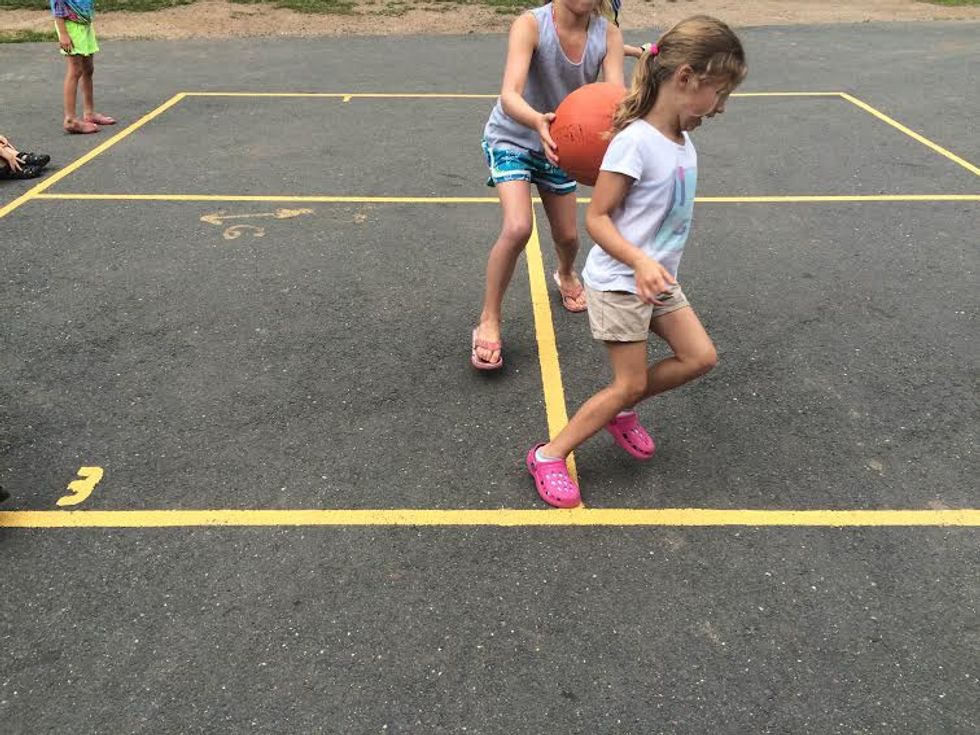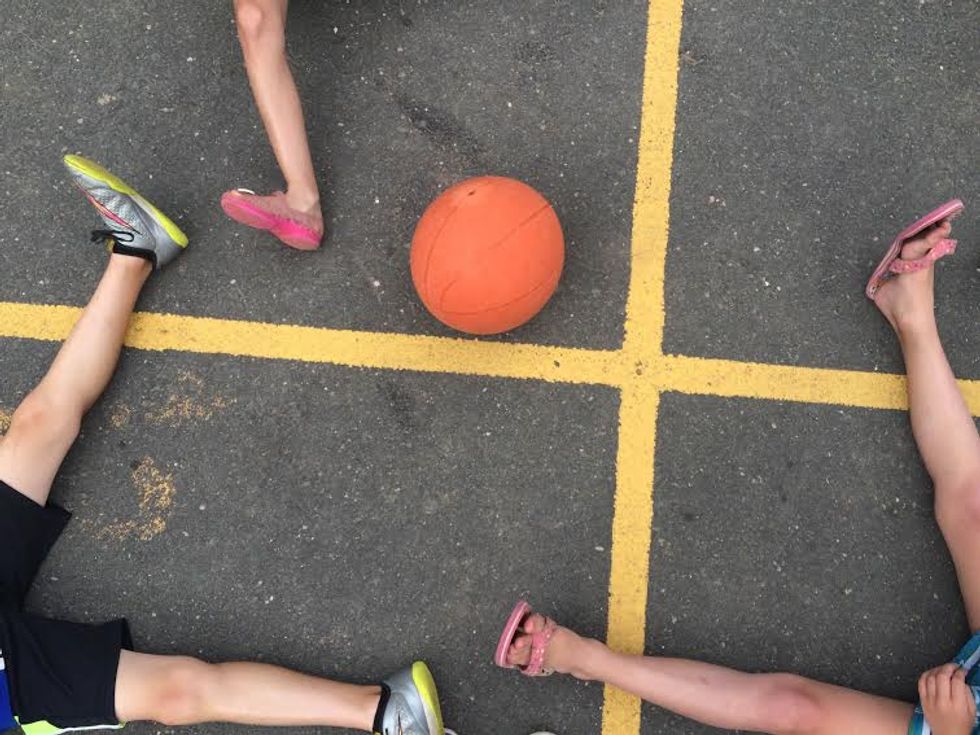Go back in time ten years. You're on the blacktop at recess and you and your friends dash to the four boxes painted on the concrete. You briefly fight over who gets to be king (usually dictated by a game of rock, paper, scissors), pick up a playground ball from the shed, and start. The only rules: only let the ball bounce once in your square, cherry-bombs are only allowed when they are announced, and a ball is "dead" when it hits someone's feet instead of the ground. The game is dictated and the rules are enforced by all members residing in the four squares, and transitions between kings are smooth. There is a desire to become skilled at the game of four square, whether it's by using "snake-eyes" to stare down an opponent only to shove the ball in another unsuspecting player's square, or by bouncing the ball as high as you can using the cherry-bomb rule to make the ball skyrocket over your victim's head. As the game advances, the slam of the ball into the ground turns into a rhythm pounding in your head, counting down the time you have before another player hurls the ball in the one part of the box you can't reach...OUT! You step out of your square, head hanging low, and walk to the end of the line where the other kids are on the tips of their toes, waiting to jump into an open spot on the court and claim the coveted king's square before the bell rings.
Fast-forward to today. Kids are sprinting to the faded four square court and shoving each other into the "toilet-flusher", "jester", and "queen" boxes as they fight for the valuable king's spot at the top left corner. Only the kid with the loudest voice screaming, "I'm king!" can claim the 3'x3' area (unless another kid wrestles the ball out of his hands, of course). The king makes an announcement: "The rules are...uh...oh, I know! Poison, birdie on a wire, and dark magic!" The kids around the court oooh and ahhh in reaction to the king's decision, the king grinning at his or her newfound power to entice a crowd of 6-11 year olds. This time the ball isn't flung from the king's square into another player's square, however, because the king called dark magic. This means that everyone on the court must close their eyes while the king moves them into different squares, typically demoting the stronger players to the "toilet-flusher" and "jester" positions in a sly attempt to prevent an overthrow of power in the game. Once the players are assigned new positions, the ball finally meets the ground. It goes back and forth between the bigger players (the predators) and the smaller players (the prey). The ball is swatted out of the court and it's declared a "dead ball." The ball then bounces twice in the jester's square and the jester blames it on the toilet-flusher, kicking the flusher out of the game. It's not long before another made-up rule is called, this time "poison:" if the king passes the ball to a player while shouting "poison," that player is automatically out. There is no rhythm to this game; the ball barely meets the ground. The line of kids anxiously waiting to step onto the court only grows longer as the king makes the most of their monarchy. The head camp counselor blows the whistle, signaling a change in activities. At least three campers remain on the court, arguing about who was the last person who got out, and one little camper is crying to a counselor because an older camper called him stupid.
This is NOT the game of four square I remember. Even though the quickest, toughest, and smartest kids were the only real competitors in capture the flag and kickball when I was in elementary school, four square was everyone's game; anyone could play it. You didn't have to be good at kicking and running bases, or be fast enough to tag your teammates out of jail. Four square was a simple game of "playing ball," one of the few activities all kids excel at. There was a maximum of five rules that weren't technically tournament rules, and every participant and spectator knew when a ball bounced twice in a square and when to kick that player off of the court. Today there are a ridiculous number of made-up rules: "dark magic," "birdie on a wire," "poison," "story time," "bus stop," "mini-Mario," "body parts," "fire line," "ABC," and "black hole," just to name a few. These rules are sometimes made up on the spot, and there's even a name for that: "pencil and eraser." Often the goals of the aforementioned rules are to target one specific player, if not the weakest player. When the king has this kind of power, it's not rare to watch a game where the ball barely hits the ground once, or where the new player who finally found a spot on the court gets kicked off without even touching the ball before returning to the end of the line.
The bottom line is that kids today have taken the one game that was safe to every child, big or small, strong or weak, fast or slow, and has spun it into a game of "You're out because I said so," and, "The king in four square is the king of all." In fact, out of all of the games played at the summer camp where I work, four square has caused the most conflict and unhappiness, even though dodgeball is in our weekly rotation! So how do we stop this bullying epidemic? I propose we bring the "old school" rules back in style and restore four square's dignity by making the game about skill, not power. Let's change the names traditionally used for the player in each square (seriously, where did "toilet-flusher" even come from? Also, girls CAN be king, FYI) to something more positive, perhaps something that sounds cool and more equal, like "the smasher," "the blaster," "the slammer," and "the whammer." Let's allow each player to start with the ball in any given round by taking turns, and let's become less stingy about re-dos. And finally, let's encourage our younger siblings, the kids we babysit, and the students we teach to challenge themselves, not others, to play by the rules and find the rhythm of the game.





















